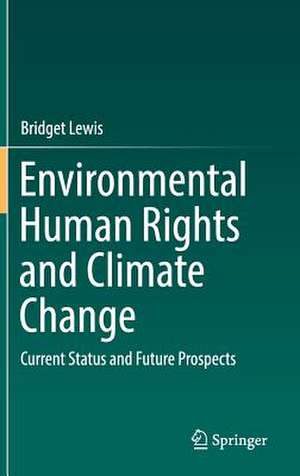Environmental Human Rights and Climate Change: Current Status and Future Prospects
Autor Bridget Lewisen Limba Engleză Hardback – 3 sep 2018
The book addresses the topic from a variety of perspectives, drawing on underlying theories of human rights as well as a range of legal, political, and pragmatic considerations. It examines the scope of current human rights, particularly those enshrined in international and regional human rights law, to explore their application and enforceability in relation to environmental problems, identifying potential barriers to more effective implementation. It also analyses the rationale for constitutional recognition of environmental rights and considers the impact that this area of law has had, both in terms of achieving stronger environmental protection and environmental justice, as well as in influencing the development of human rights law more generally.
The book identifies climate change as the key environmental challenge facing the global community, as well as a major cause of negative human rights impacts. It examines the contribution that environmental human rights might make to rights-based approaches to climate change.
| Toate formatele și edițiile | Preț | Express |
|---|---|---|
| Paperback (1) | 638.76 lei 6-8 săpt. | |
| Springer Nature Singapore – 10 ian 2019 | 638.76 lei 6-8 săpt. | |
| Hardback (1) | 894.46 lei 6-8 săpt. | |
| Springer Nature Singapore – 3 sep 2018 | 894.46 lei 6-8 săpt. |
Preț: 894.46 lei
Preț vechi: 1090.81 lei
-18% Nou
Puncte Express: 1342
Preț estimativ în valută:
171.15€ • 186.50$ • 144.22£
171.15€ • 186.50$ • 144.22£
Carte tipărită la comandă
Livrare economică 23 aprilie-07 mai
Preluare comenzi: 021 569.72.76
Specificații
ISBN-13: 9789811319594
ISBN-10: 9811319596
Pagini: 400
Ilustrații: X, 250 p.
Dimensiuni: 155 x 235 mm
Greutate: 0.54 kg
Ediția:1st ed. 2018
Editura: Springer Nature Singapore
Colecția Springer
Locul publicării:Singapore, Singapore
ISBN-10: 9811319596
Pagini: 400
Ilustrații: X, 250 p.
Dimensiuni: 155 x 235 mm
Greutate: 0.54 kg
Ediția:1st ed. 2018
Editura: Springer Nature Singapore
Colecția Springer
Locul publicării:Singapore, Singapore
Cuprins
1. Introduction to Environmental Human Rights and Climate Change.- 2. Environmental dimensions of human rights.- 3. Constitutional Environmental Rights.- 4. The human right to a good environment in international law.- 5. The theoretical basis for expanding environmental human rights.- 6. Legal, practical and political implications of expanding environmental human rights.- 7. The role of environmental human rights in addressing climate change.- 8. Challenges confronting a human rights-based approach to climate change.- 9. Do we need a new environmental human right to deal with climate change?.- 10. Future directions for environmental human rights in a changing climate.
Notă biografică
Bridget Lewis is Senior Lecturer in the Faculty of Law at Queensland University of Technology. Her principal research interests relate to international human rights law, particularly the area of environmental human rights, and she has published in the areas of environmental justice and human rights approaches to natural disaster and displacement.
Textul de pe ultima copertă
This book examines the current status of environmental human rights at the international, regional, and national levels and provides a critical analysis of possible future developments in this area, particularly in the context of a changing climate. It examines various conceptualisations of environmental human rights, including procedural rights relating to the environment, constitutional environmental rights, the environmental dimensions of existing human rights such as the rights to water, health, food, housing and life, and the notion of a stand-alone human right to a healthy environment.
The book addresses the topic from a variety of perspectives, drawing on underlying theories of human rights as well as a range of legal, political, and pragmatic considerations. It examines the scope of current human rights, particularly those enshrined in international and regional human rights law, to explore their application and enforceability in relation to environmental problems, identifying potential barriers to more effective implementation. It also analyses the rationale for constitutional recognition of environmental rights and considers the impact that this area of law has had, both in terms of achieving stronger environmental protection and environmental justice, as well as in influencing the development of human rights law more generally.
The book identifies climate change as the key environmental challenge facing the global community, as well as a major cause of negative human rights impacts. It examines the contribution that environmental human rights might make to rights-based approaches to climate change.
The book addresses the topic from a variety of perspectives, drawing on underlying theories of human rights as well as a range of legal, political, and pragmatic considerations. It examines the scope of current human rights, particularly those enshrined in international and regional human rights law, to explore their application and enforceability in relation to environmental problems, identifying potential barriers to more effective implementation. It also analyses the rationale for constitutional recognition of environmental rights and considers the impact that this area of law has had, both in terms of achieving stronger environmental protection and environmental justice, as well as in influencing the development of human rights law more generally.
The book identifies climate change as the key environmental challenge facing the global community, as well as a major cause of negative human rights impacts. It examines the contribution that environmental human rights might make to rights-based approaches to climate change.
Caracteristici
Provides comprehensive analysis of environmental human rights, encompassing international, regional, and constitutional law Offers a multi-faceted critical consideration of the feasibility and justifiability of a right to a healthy environment within international human rights law Explores theoretical implications, including coverage of criticism based on deep ecology and other theories of the environment
